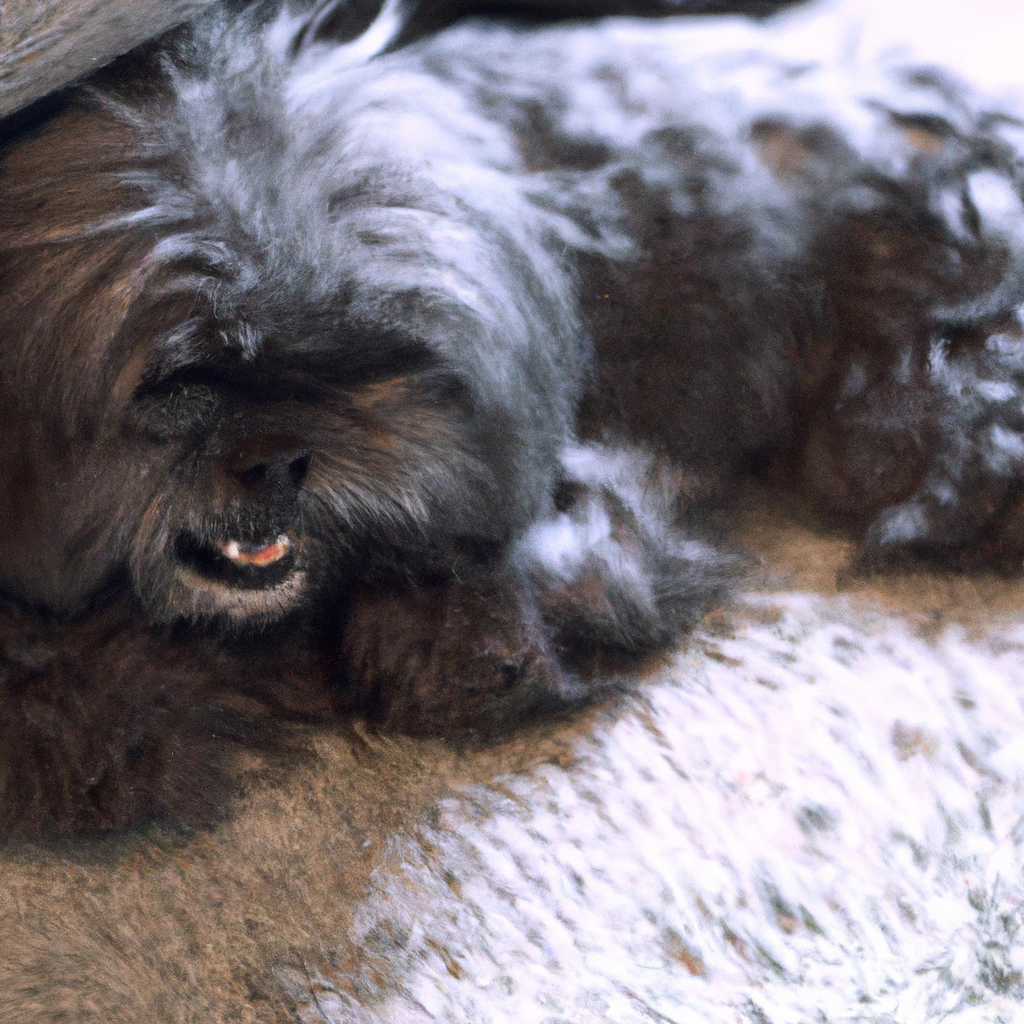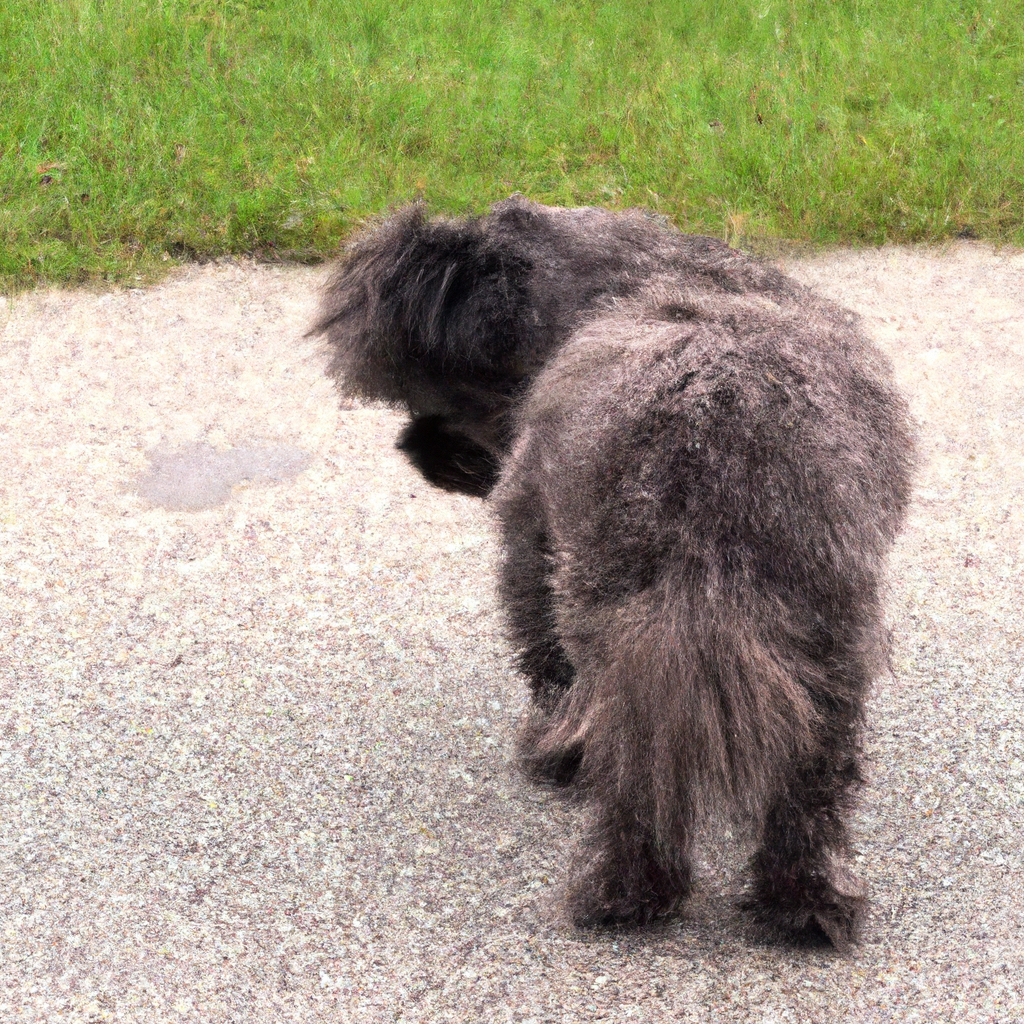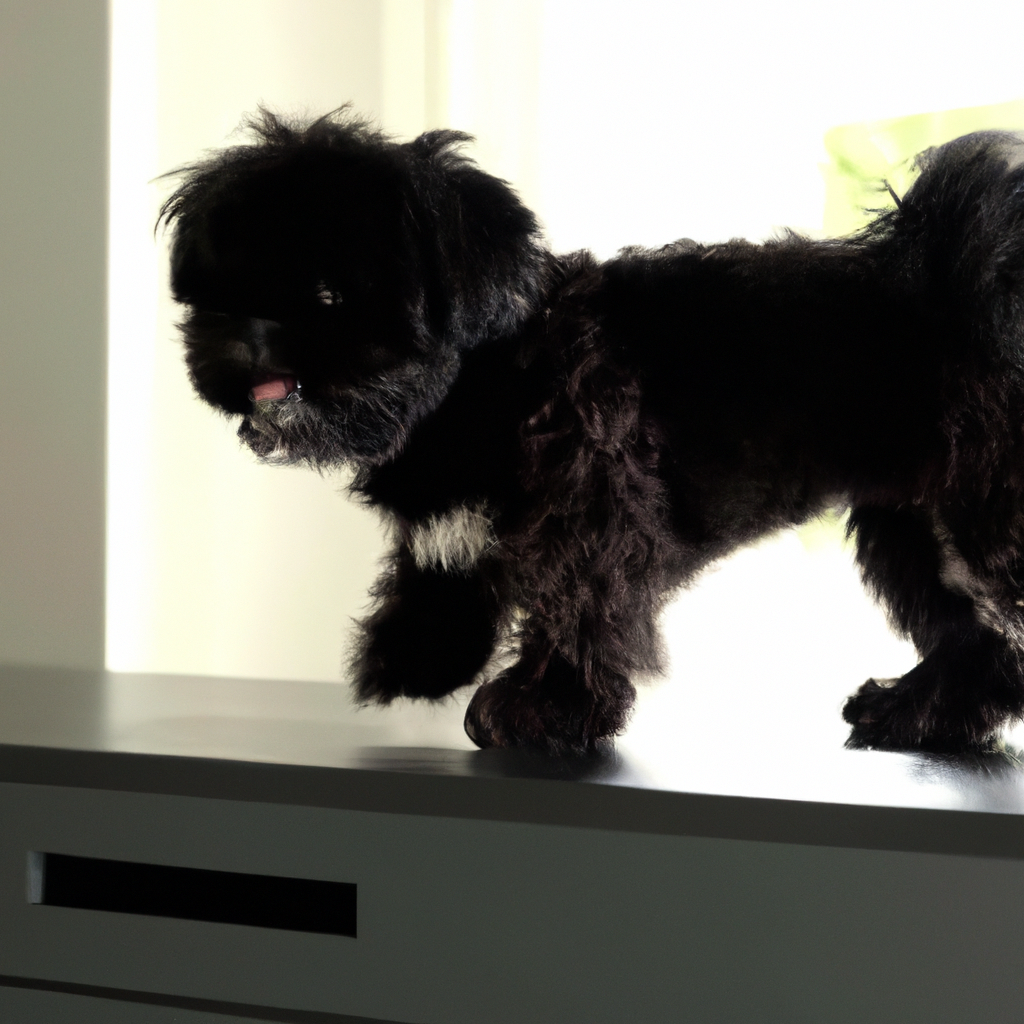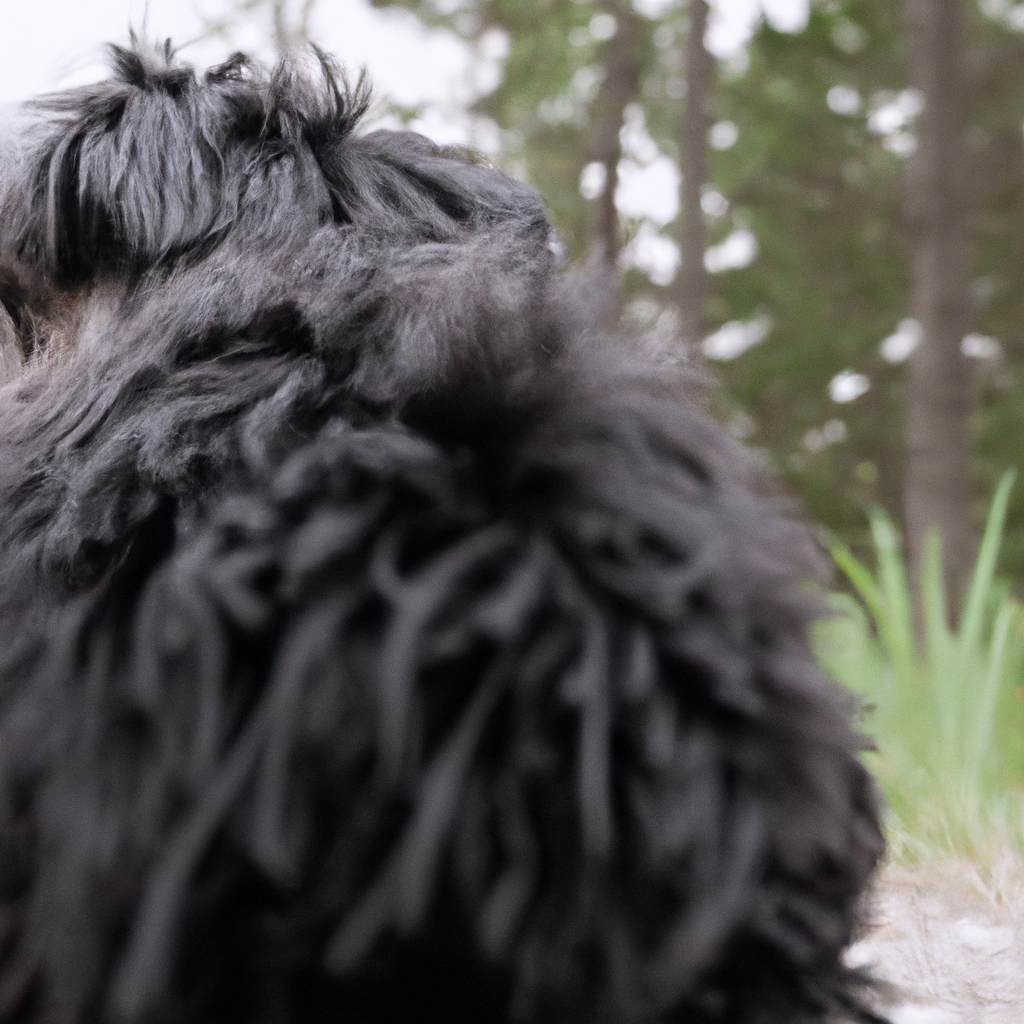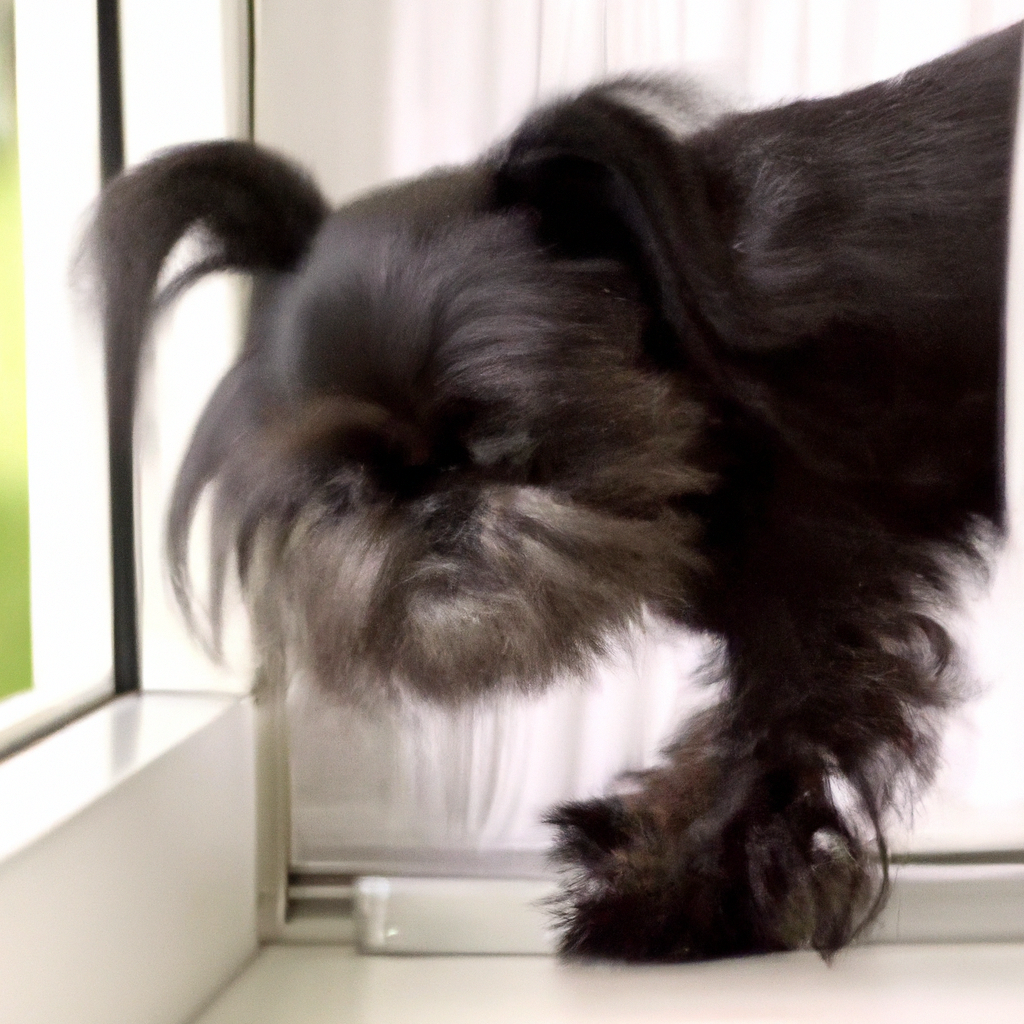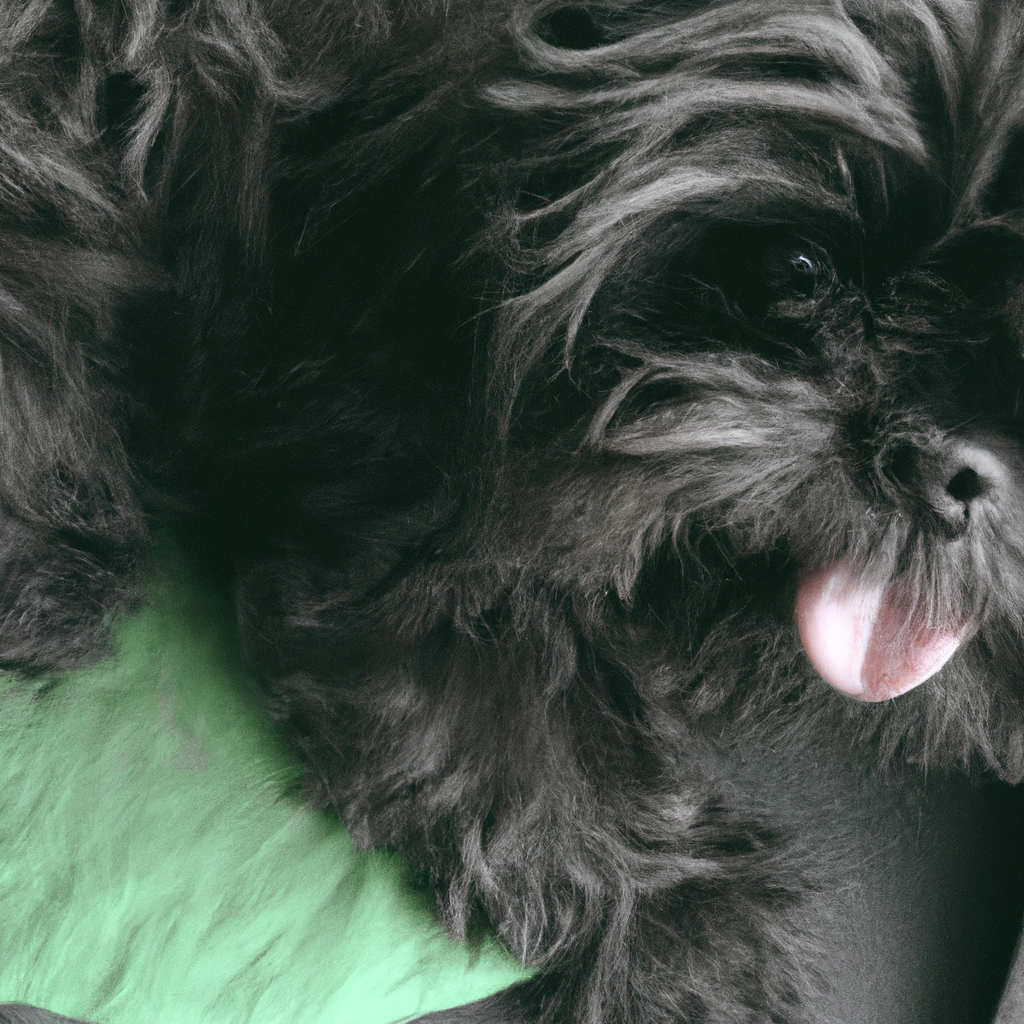Affenpinschers, also known as “Monkey Terriers,” are small but highly energetic and stubborn dogs. Common behavioral issues with Affenpinschers include excessive barking, stubbornness, and a tendency to be territorial. They can also exhibit aggressive behavior towards other dogs and strangers due to their protective nature. Additionally, they can be difficult to housebreak and may have a propensity for chewing. Despite these challenges, with proper training and socialization, these behaviors can be managed effectively.
Understanding Affenpinschers: Common Behavioral Issues
Affenpinschers, often referred to as “Monkey Terriers” due to their distinct primate-like appearance, are small but mighty dogs known for their playful and adventurous spirit. However, like any breed, they come with their own set of behavioral issues that potential owners should be aware of. Understanding these common behavioral issues can help you better manage your Affenpinscher and ensure a harmonious relationship.
Firstly, Affenpinschers are known for their stubbornness. This trait can make training a bit of a challenge. They are intelligent dogs, but their independent nature means they may not always be interested in following commands. This can be particularly problematic when it comes to house training. Patience and consistency are key when training an Affenpinscher. Positive reinforcement methods, such as treats and praise, can be particularly effective.
Secondly, Affenpinschers are prone to developing separation anxiety. They form strong bonds with their human companions and can become distressed when left alone for extended periods. This can lead to destructive behaviors such as chewing on furniture or excessive barking. To mitigate this, it’s important to gradually acclimate your Affenpinscher to being alone. Start by leaving them alone for short periods and gradually increase the duration. Providing them with plenty of toys and activities can also help keep them occupied.
Another common behavioral issue with Affenpinschers is their tendency to be territorial. They were originally bred to hunt rats and other pests, and this instinct can sometimes translate into a desire to protect their home and family. This can lead to aggressive behaviors, particularly towards strangers or other animals. Early socialization is crucial in preventing this. Exposing your Affenpinscher to a variety of people, places, and experiences can help them become more comfortable in different situations.
Affenpinschers are also known for their high energy levels. Without proper outlets for this energy, they can become hyperactive and difficult to manage. Regular exercise is essential for this breed. This can include walks, playtime in the yard, or even agility training. Mental stimulation is equally important. Puzzle toys, training sessions, and interactive games can help keep your Affenpinscher’s mind sharp and prevent boredom.
Lastly, Affenpinschers can be quite vocal. They are known for their distinctive bark, which they are not afraid to use. This can become a problem, particularly in apartment settings or areas with noise restrictions. Training your Affenpinscher to understand when it’s appropriate to bark and when it’s not can help manage this issue.
In conclusion, while Affenpinschers are charming and lovable dogs, they do come with their own set of behavioral challenges. Understanding these issues is the first step in managing them effectively. With patience, consistency, and a good understanding of the breed, you can enjoy a rewarding and fulfilling relationship with your Affenpinscher. Remember, every dog is unique and may not display all these behaviors. It’s always important to spend time with your pet to understand their individual personality and needs.
Addressing Aggression in Affenpinschers: A Comprehensive Guide
Affenpinschers, often referred to as “Monkey Terriers” due to their distinct primate-like appearance, are small but mighty dogs known for their playful and adventurous spirit. However, like any breed, they can exhibit certain behavioral issues, with aggression being one of the most common. Understanding the root causes of this aggression and learning how to address it effectively is crucial for any Affenpinscher owner.
Affenpinschers are naturally protective and territorial, which can sometimes manifest as aggression. This is particularly true if they feel their space is being invaded or if they perceive a threat to their family. It’s important to remember that this behavior is not necessarily a sign of a ‘bad’ dog, but rather an instinctual response.
One of the first steps in addressing aggression in Affenpinschers is to identify its triggers. Is your dog reacting to a specific person, another animal, or a particular situation? Once you’ve pinpointed the cause, you can begin to work on a solution. For instance, if your Affenpinscher becomes aggressive when meeting new people, gradual and positive introductions can help them become more comfortable.
Training is another key component in managing aggression. Affenpinschers are intelligent and eager to please, which makes them highly trainable. Consistent, positive reinforcement methods work best with this breed. Rewarding good behavior with treats, praise, or play can encourage your Affenpinscher to repeat those behaviors. On the other hand, punishing aggressive behavior can often exacerbate the issue, leading to more aggression out of fear or confusion.
Socialization is also crucial in curbing aggression. Exposing your Affenpinscher to a variety of people, animals, and environments from a young age can help them become more adaptable and less likely to react aggressively to new situations. Regular walks, trips to the dog park, or playdates with other dogs can provide valuable socialization opportunities.
In some cases, aggression in Affenpinschers may be linked to underlying health issues. Pain or discomfort can make even the most docile dog lash out. Regular vet check-ups can help identify any potential health problems and address them before they lead to behavioral issues.
If your Affenpinscher’s aggression continues despite your best efforts, it may be time to seek professional help. A certified dog behaviorist or trainer can provide personalized strategies and techniques to manage aggression based on your dog’s specific needs and circumstances.
Lastly, patience is key when dealing with aggression in Affenpinschers. Changing behavior takes time and consistency. It’s important to stay calm and patient throughout the process, as your dog will pick up on your emotions and react accordingly. Remember, your Affenpinscher isn’t being aggressive to spite you – they’re simply reacting to their environment in the only way they know how.
In conclusion, while Affenpinschers can exhibit aggressive behavior, it’s important to remember that this is not a reflection of their character. With understanding, training, socialization, and patience, you can help your Affenpinscher manage their aggression and become the loving, playful companion they’re meant to be.
Excessive Barking: A Common Issue in Affenpinschers
Affenpinschers, often referred to as “Monkey Terriers” due to their distinct primate-like appearance, are small but mighty dogs known for their playful and adventurous spirit. However, like any breed, they come with their own set of behavioral quirks. One of the most common issues that Affenpinscher owners face is excessive barking.
Affenpinschers are naturally alert and protective, which makes them excellent watchdogs. They are quick to sound the alarm at any perceived threat, be it a stranger at the door or a squirrel in the yard. However, this protective instinct can sometimes translate into excessive barking, which can become a nuisance if not properly managed.
Excessive barking in Affenpinschers is often a response to stimuli in their environment. They are sensitive dogs that are easily excited or agitated by new sights, sounds, and smells. This means that a passing car, a ringing doorbell, or even a new piece of furniture can trigger a barking episode.
Moreover, Affenpinschers are known for their high energy levels and need for constant stimulation. If they are bored or not getting enough exercise, they may resort to barking as a way to release pent-up energy or to get their owner’s attention.
So, how can you manage this behavior? The first step is to understand that barking is a natural behavior for dogs, especially for a breed like the Affenpinscher that was bred to alert their owners of potential threats. Punishing your dog for barking can often lead to more behavioral problems down the line.
Instead, try to identify the triggers that cause your Affenpinscher to bark excessively. Once you’ve identified these triggers, you can work on desensitizing your dog to them. This might involve gradually exposing your dog to the trigger in a controlled environment and rewarding them for remaining calm.
Another effective strategy is to provide your Affenpinscher with plenty of physical and mental stimulation. Regular walks, play sessions, and puzzle toys can help to burn off excess energy and keep your dog’s mind occupied, reducing the likelihood of boredom-induced barking.
Training is also a crucial part of managing excessive barking. Teaching your Affenpinscher commands like “quiet” or “enough” can be very helpful. Remember, consistency is key when it comes to training. Make sure all family members are using the same commands and rewarding the same behaviors to avoid confusing your dog.
In some cases, excessive barking may be a sign of an underlying issue such as separation anxiety or a medical problem. If your Affenpinscher’s barking is accompanied by other concerning behaviors like destructive chewing or inappropriate elimination, or if it seems to be in response to being left alone, it may be worth consulting with a veterinarian or a professional dog behaviorist.
In conclusion, while excessive barking can be a common issue in Affenpinschers, it’s important to remember that it’s a natural behavior for this breed. With patience, understanding, and consistent training, it’s possible to manage this behavior and ensure that your Affenpinscher is a well-behaved and happy member of your family.
Dealing with Separation Anxiety in Affenpinschers
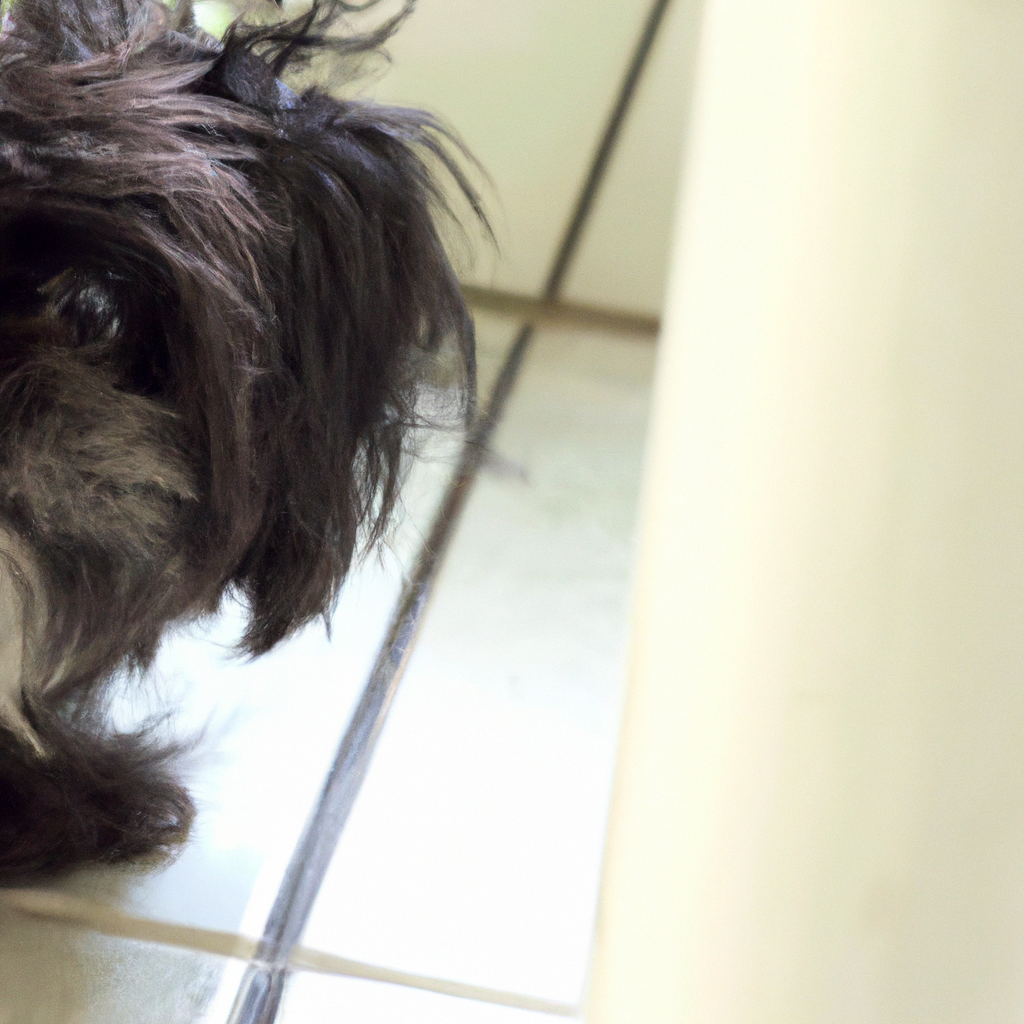
Affenpinschers, often referred to as “Monkey Terriers” due to their distinct primate-like appearance, are small but mighty dogs known for their playful and adventurous spirit. However, like any breed, they can exhibit certain behavioral issues, one of the most common being separation anxiety. This article will delve into this issue, providing insights on how to identify and manage it effectively.
Separation anxiety in Affenpinschers, as in other breeds, is a distressing condition that can manifest when the dog is left alone or separated from its human companions. This anxiety can lead to a variety of problematic behaviors, including excessive barking, destructive chewing, and even attempts to escape. It’s important to understand that these behaviors are not a sign of disobedience or spite, but rather a response to the intense fear and stress your Affenpinscher is experiencing.
Identifying separation anxiety in your Affenpinscher can be challenging, as the symptoms often occur when you’re not home. However, there are telltale signs to look out for. If you come home to find chewed furniture, scratched doors, or soiled carpets, your Affenpinscher might be suffering from separation anxiety. Additionally, if your neighbors report excessive barking or howling during your absence, this could be another indication.
Once you’ve identified the issue, the next step is to manage it. One effective strategy is to create a safe and comfortable space for your Affenpinscher. This could be a specific room or a crate where your dog feels secure. Fill this space with familiar items like their favorite toys or a piece of your clothing. The scent of their human can provide a sense of comfort and reduce anxiety.
Another useful technique is to establish a consistent routine. Affenpinschers, like most dogs, thrive on predictability. Regular feeding times, walks, and play sessions can help alleviate anxiety by providing a sense of structure and security. It’s also beneficial to practice leaving and returning home without making a big fuss. This can help your dog understand that your departures and arrivals are normal parts of the day and not something to be feared.
Gradual desensitization is another effective method for managing separation anxiety. This involves leaving your Affenpinscher alone for short periods and gradually increasing the duration over time. Start with just a few minutes and slowly work your way up. This process can help your dog become accustomed to being alone and reduce their anxiety.
In severe cases, it may be necessary to seek professional help. A certified animal behaviorist or a veterinarian can provide further guidance and may recommend medication or other treatments to help manage the anxiety.
Remember, patience is key when dealing with separation anxiety in Affenpinschers. It’s a challenging issue, but with understanding, consistency, and a little bit of time, it can be effectively managed. Your Affenpinscher is a loyal and loving companion, and with your help, they can overcome their anxiety and live a happy, healthy life.
Affenpinschers and Destructive Chewing: How to Manage
Affenpinschers, often referred to as “Monkey Terriers” due to their distinct primate-like appearance, are small but mighty dogs known for their playful and adventurous spirit. However, like any breed, they can exhibit certain behavioral issues, one of the most common being destructive chewing. This behavior can be frustrating for pet owners, but understanding why it occurs and how to manage it can make a world of difference.
Destructive chewing in Affenpinschers, as with many other breeds, is often a result of boredom or anxiety. These energetic dogs require a good deal of mental and physical stimulation to keep them happy and healthy. Without it, they may resort to chewing on furniture, shoes, or anything else within their reach. It’s their way of entertaining themselves and releasing pent-up energy.
Similarly, Affenpinschers can also chew destructively when they’re feeling anxious. This could be due to a variety of factors, such as a change in their environment, separation from their owners, or even a response to loud noises like thunderstorms or fireworks. In these instances, chewing serves as a coping mechanism, providing a sense of comfort and distraction from their stressors.
Now that we understand why Affenpinschers might engage in destructive chewing, let’s delve into how to manage this behavior. The first step is to ensure your Affenpinscher is getting enough exercise. Regular walks, playtime, and mental stimulation through puzzle toys or training exercises can go a long way in curbing destructive behaviors. A tired dog is a well-behaved dog, as the saying goes.
Next, consider providing your Affenpinscher with appropriate chew toys. These can serve as a safe and acceptable outlet for their chewing urges. Be sure to choose durable toys that can withstand their strong jaws and replace them regularly to keep your dog interested.
In cases where anxiety is the root cause of destructive chewing, it may be beneficial to consult with a professional dog trainer or a veterinarian. They can provide guidance on techniques to help alleviate your dog’s anxiety, such as crate training or the use of calming products.
It’s also important to remember that patience and consistency are key when addressing behavioral issues. If you catch your Affenpinscher chewing on something they shouldn’t, calmly redirect them to an appropriate chew toy. Over time, they’ll learn what items are off-limits.
Lastly, while it may be tempting to scold or punish your Affenpinscher for destructive chewing, this approach is often counterproductive. It can increase their anxiety levels, potentially exacerbating the problem. Instead, focus on positive reinforcement. Praise and reward your dog when they chew on their toys, reinforcing the behavior you want to see.
In conclusion, while destructive chewing can be a common issue with Affenpinschers, it’s certainly manageable. By understanding the underlying causes and implementing strategies like regular exercise, appropriate chew toys, and positive reinforcement, you can help curb this behavior. Remember, every dog is unique, so what works for one Affenpinscher may not work for another. It may take some trial and error to find the right approach for your furry friend, but with patience and consistency, you can guide your Affenpinscher towards healthier chewing habits.
The Challenge of Stubbornness in Affenpinschers
Affenpinschers, often referred to as “Monkey Terriers” due to their distinct primate-like appearance, are small but mighty dogs known for their playful and adventurous spirit. However, like any breed, they come with their own set of behavioral challenges. One of the most common issues that Affenpinscher owners face is their dog’s stubbornness.
Affenpinschers are intelligent and independent dogs, which can sometimes translate into a stubborn streak. This trait can make training a bit of a challenge. They are known to have a mind of their own and can be quite determined when they set their sights on something. This stubbornness is often seen when they are asked to perform tasks or follow commands that they don’t want to do. They may simply ignore the command, or even worse, do the exact opposite.
This stubbornness is not a sign of a bad dog or poor training. It’s simply a part of their personality. Affenpinschers are known for their strong will and determination, traits that have been bred into them for centuries. These traits, while sometimes frustrating, are also what make them such unique and lovable pets.
However, this doesn’t mean that you should let your Affenpinscher walk all over you. It’s important to establish clear boundaries and expectations from the start. Consistency is key when dealing with a stubborn dog. If you give in to their demands even once, they will quickly learn that they can get their way if they are persistent enough.
Training an Affenpinscher requires patience and a firm but gentle hand. They respond best to positive reinforcement methods, such as treats and praise. Harsh punishment or scolding will only make them more stubborn and less likely to listen to you. It’s also important to keep training sessions short and fun to keep their interest.
Socialization is another crucial aspect of dealing with a stubborn Affenpinscher. These dogs are naturally wary of strangers and can be quite protective of their family. Early socialization can help them become more comfortable around new people and situations, reducing their stubbornness and making them more adaptable.
Despite their stubbornness, Affenpinschers are incredibly loyal and affectionate dogs. They form strong bonds with their families and are always eager to please. With the right approach, you can channel their stubbornness into a positive trait, turning their determination into a drive to learn and succeed.
In conclusion, while Affenpinschers can be stubborn, this trait is just a part of their unique personality. With patience, consistency, and a positive approach, you can turn this challenge into an opportunity to build a strong and rewarding relationship with your Affenpinscher. Remember, every dog has its quirks, and it’s these quirks that make them special. So, embrace your Affenpinscher’s stubbornness, and enjoy the journey of training and bonding with your little “Monkey Terrier”.
Affenpinschers and Territorial Behavior: What You Need to Know
Affenpinschers, often referred to as “Monkey Terriers” due to their distinct primate-like appearance, are small but mighty dogs known for their playful and adventurous spirit. However, like any breed, they come with their own set of behavioral quirks. One of the most common behavioral issues with Affenpinschers is their territorial nature. This article will delve into this particular trait, providing you with the necessary information to understand and manage it effectively.
Affenpinschers are known for their loyalty and protective nature, which can sometimes translate into territorial behavior. This is not necessarily a negative trait, as it can make them excellent watchdogs. However, it can become problematic if not properly managed. They may become overly protective of their home, toys, food, or even their favorite human, leading to aggressive behavior towards strangers or other pets.
This territorial behavior is often rooted in their instinct to protect their pack. In the wild, dogs use aggressive behavior to ward off potential threats to their territory or their pack. While your Affenpinscher is far removed from its wild ancestors, this instinct can still kick in, especially in situations where they feel threatened or insecure.
Understanding this behavior is the first step towards managing it. It’s important to remember that your Affenpinscher is not being ‘bad’ or ‘naughty’ when they display territorial behavior. They are simply acting on their instincts. However, this doesn’t mean that you should let this behavior go unchecked.
Training is key in managing an Affenpinscher’s territorial behavior. Start by establishing clear boundaries and rules. For instance, if your Affenpinscher is protective of their food, establish a rule that they must sit and wait calmly before they are allowed to eat. If they are territorial over a particular spot in the house, teach them to ‘leave it’ on command.
Socialization is another crucial aspect of managing territorial behavior. Expose your Affenpinscher to a variety of people, places, and situations from a young age. This will help them understand that not everything unfamiliar is a threat. Regular interaction with other dogs can also help curb their territorial instincts, as it teaches them to share space and resources.
While training and socialization can go a long way in managing territorial behavior, sometimes professional help may be needed. If your Affenpinscher’s territorial behavior is causing significant problems or if they are showing signs of aggression, it may be worth consulting with a professional dog trainer or behaviorist. They can provide you with tailored strategies and techniques to manage your dog’s behavior effectively.
In conclusion, while Affenpinschers are known for their territorial behavior, it’s important to remember that this is a natural instinct for them. With understanding, patience, and the right training techniques, you can manage this behavior effectively, ensuring that your Affenpinscher remains a happy and well-adjusted member of your family. Remember, every dog is unique, and what works for one Affenpinscher may not work for another. So, be patient, stay consistent, and don’t hesitate to seek professional help if needed.
Training Tips for Affenpinschers with Socialization Issues
Affenpinschers, often referred to as “Monkey Terriers” due to their distinct primate-like appearance, are small but mighty dogs known for their playful and adventurous spirit. However, like any breed, they can exhibit certain behavioral issues, particularly when it comes to socialization. Understanding these issues and knowing how to address them can make a world of difference in your relationship with your Affenpinscher.
Affenpinschers are naturally protective and territorial, which can sometimes translate into aggression towards other dogs or strangers. This is not because they are inherently aggressive, but rather because they are trying to protect their family. This behavior can be problematic, especially in public places or when guests visit your home.
One of the most effective ways to address this issue is through early socialization. The earlier an Affenpinscher is exposed to different people, animals, and environments, the more comfortable they will be in various situations. This exposure helps them understand that not all strangers are threats, reducing their instinct to protect their family aggressively.
Training an Affenpinscher with socialization issues can be a bit challenging, but it’s certainly not impossible. Start by introducing your dog to new people and animals in a controlled environment. This could be at home, where your dog feels safe and secure. Gradually increase the number of new faces your dog meets, always ensuring that these interactions are positive. Reward your Affenpinscher with treats and praise when they behave well around others.
Another effective strategy is to enroll your Affenpinscher in obedience classes or doggy daycare. These environments provide ample opportunities for your dog to interact with others under the supervision of professionals who understand dog behavior. They can guide your dog through positive interactions, helping them learn appropriate social behavior.
It’s also important to remember that Affenpinschers are intelligent and energetic dogs. They require mental stimulation and physical exercise to prevent boredom, which can often lead to destructive behavior. Regular walks, playtime, and puzzle toys can help keep your Affenpinscher engaged and happy.
Patience is key when dealing with an Affenpinscher’s socialization issues. It’s crucial to remember that change won’t happen overnight. It’s a gradual process that requires consistent effort and positive reinforcement. Never punish your Affenpinscher for their socialization issues. This will only create fear and anxiety, which can exacerbate the problem. Instead, focus on rewarding good behavior and gently correcting undesirable actions.
In some cases, you may find it beneficial to seek the help of a professional dog trainer or behaviorist. These experts can provide personalized training plans and strategies to address your Affenpinscher’s specific needs. They can also offer valuable advice and support throughout the training process.
In conclusion, while Affenpinschers may have a reputation for being a bit feisty, they are also incredibly loving and loyal dogs. With the right approach to socialization and training, you can help your Affenpinscher overcome their behavioral issues and become a well-adjusted member of your family. Remember, every dog is unique, and what works for one may not work for another. It’s all about finding the right balance and approach for your Affenpinscher. With patience, consistency, and love, you can help your Affenpinscher become the best they can be.In conclusion, common behavioral issues with Affenpinschers include stubbornness, excessive barking, and potential aggression towards other dogs and strangers. They can also exhibit possessiveness over their toys and food. These issues can be managed with consistent training and socialization from a young age.
